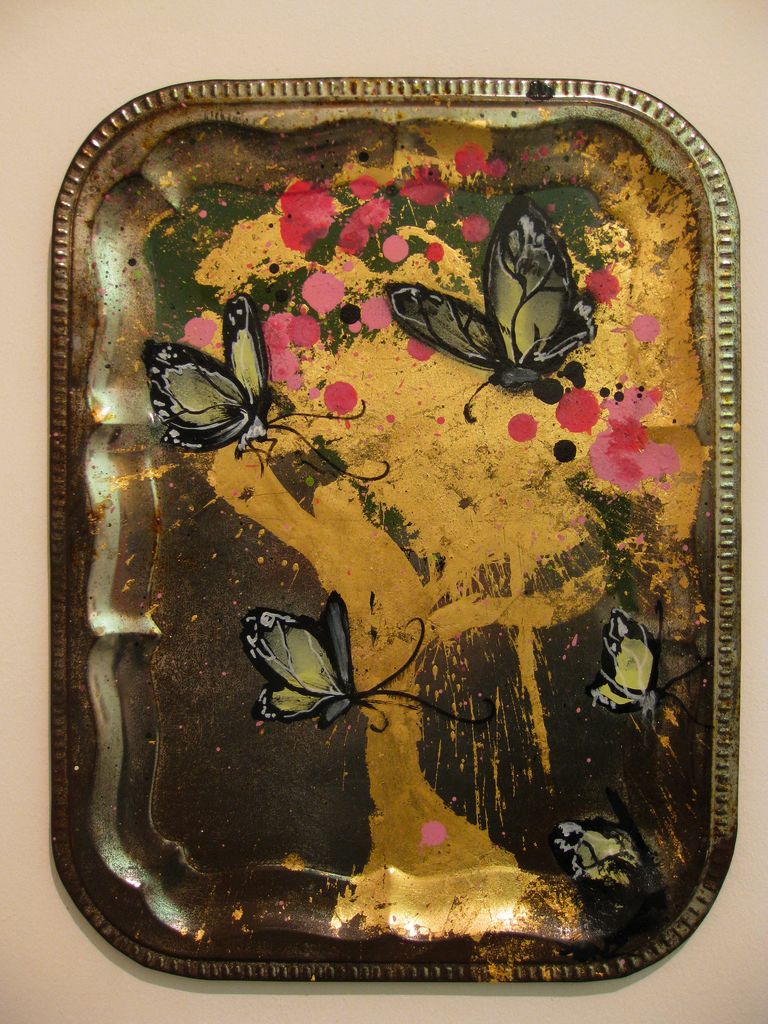
I'm amazed at this work by Antonio Laguna Cabezuelo, which I found on woostercollective. It took me a few minutes to realize there are sculptural elements involved-- the boxes on the right, and the corner shelf. It's nothing if not inspiring.

This is by XENZ. See more of his stuff here. I love motifs! Even if it's as simple and perfect as butterflies.
In other news, I spent a large part of the day compiling quotes from Unica Zürn's diaries, and was fascinated. It was a 4 hour + project for the Drawing Center, and yet I was practically sitting at the edge of the chair the entire time. Perhaps research on artists' autobiographical writing is in the near future?
Unica Zürn is a German surrealist artist. Like most artists, she was completely and utterly crazy. Raped by her brother as a child and faced with a father who was continually absent from her life, Unica led a tragic and guilt-ridden life. At one point her husband at the time joined the Nazi party; Unica never recovered from her guilt. Although she did become quite famous, had a meaningful relationship with Hans Bellmer, another surrealist artist, and was brought into the same circle as Miro and Ernst, the last years of her life are a string of hospitalizations and incarcerations. Depressing, fascinating, brilliant. I tried to create a drawing inspired by Unica and never could; I figured I simply wasn't crazy enough. She is perhaps the only example of automatism that I ever liked (then again, it certainly has aesthetic qualities, and it's certainly a display of talent and what my Figure Drawing professor, and Hemingway, would describe as "her own personal truth").
Examples of Unica Zürn's work:

 And then there are her diaries, her experiences in the mental institutions. Even translated from German her writing is so compelling! Some of my favorite quotes:
And then there are her diaries, her experiences in the mental institutions. Even translated from German her writing is so compelling! Some of my favorite quotes:
“On the morning of her seventeenth birthday, the princess went walking in the park. She was not at all content […] When suddenly she felt a strange, tingling restlessness, beginning in her fingertips and spreading all the way to her toes. She lost all sense of reality and suddenly found herself with a long neck and, before she could stop herself, she bent her head towards the ground and began to tear out the grass, chewing and swallowing it, and this brought her a pleasure so enormous […] that she began to lick her chops […] The princess was transformed into a handsome animal with a long, brown, silky coat. It had happened in the wink of an eye. And now she looked like an Irish pony, with only the huge pointed ears vaguely suggesting a little donkey.” (The Wondrous Animal, radio piece, 6. 205)
“Since 1949 threatening, distressing things have been happening in my dreams. A mountain of events crushes me, night after night. I’ll never get it cleared away. That’s how you end up feeling like a fool. That’s it, that’s my basic attitude. But for the last six months I’ve been taking sleeping tablets, even though I have such a gift for sleep. And surprise surprise! The little drug cuts out my dreams, those strands that bound me for eight whole years and made me dance sinisterly at night. Since then my esteem for the pharmacopoeia has just kept on rising. The drug: Supponeryl. Sleep without dreams, live without pain. You can do it for only two hundred francs a pack.” (Notizen einer Blutarmen)
“As there was to be a lunch with Michaux, I really dolled my-self up: A black pleated skirt Hans had given me, a very delicate organdie blouse—a present from Man Ray’s wife—and a little black velvet ribbon around my neck. My hair was piled up in the 1900 style. Michaux had invited us to a Chinese restaurant. I ate sweet fish and bananas fried in butter, and while I was smugly eating away, my monumental hairdo collapsed.” (Letter, 4.2. 562)
“They take her away in silence and a long journey begins behind the mesh of a police van. She does not know where they are taking her. The journey has ended. She is led into a house, in front of a group of silent men in white. Could they exude a greater melancholy? Their eyes are full of a dark, mute sadness. Has some mishap taken place here? And who is the victim?” (The Man of Jasmine)
I cannot think of a sadder thing than the inability to dream. A little part of me wonders whether it is the lack of dreaming that caused insanity. Perhaps that's what dreams are for: to keep us sane, to keep those random bursts of electrical energy in our brains from getting misappropriated elsewhere.
No comments:
Post a Comment